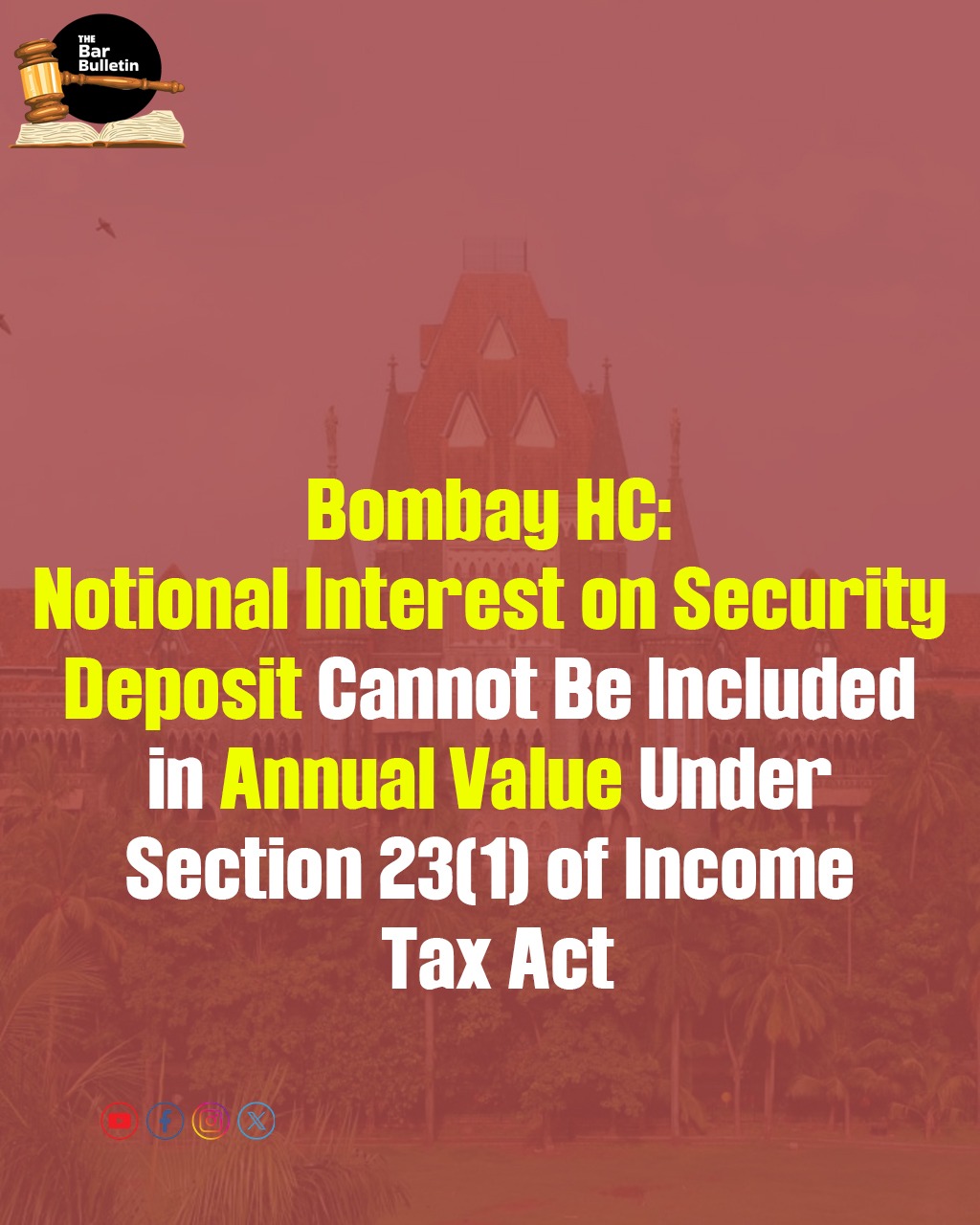The Bombay High Court recently ruled that notional interest on security deposit received while letting out property cannot form part of actual rent, for determination of annual value under Section 23(1) and the municipal annual ratable value alone cannot be taken into consideration for the purpose of determining annual value of the property under Section 23(1)(a) of the Income Tax Act. Further, whether property is actually let out or not, the annual value of the property still becomes chargeable to income tax under Section 22 of the Income Tax Act, added the Court.
The Division Bench comprising Chief Justice Alok Aradhe and Justice Sandeep V. Marne observed that the concept of standard rent applies only where there is a statutory tenant in the premises in question, who enjoys protection from rent escalation and eviction, and in respect of the premises which are not governed by the provisions of the Rent Control Legislations, the concept of standard rent becomes wholly inapplicable. The Bench also added that the production of letters from the Developer or Society cannot be treated as sufficient compliance with the requirement of proving the municipal rateable value.
The Bench found that the present case involves letting of premises on a nominal amount of license fees while accepting a hefty amount of security deposit, and therefore, the AO refused to accept the license fees indicated in the licence agreement as the annual value of the property for taxation under Sections 22 and 23 of the Act. Further, the AO has not determined the gross annual rateable value of the property at Rs. 22 lacs only based on notional interest on security deposit, but he has considered the comparable instance of letting out property in the same building to the same licensee (Citi Bank) while making an enquiry under the provisions of Section 23.
The Bench went on to observe that the Municipal Authorities do conduct a survey of rental returns in each locality while determining the annual rateable value. However, such municipal rateable value is not updated, or in some cases, the same does not represent the correct annual rent received qua a particular property. In a given case, the rental value of premises in two adjoining buildings in the City of Mumbai can be different. Various factors, such as the condition of the building, accessibility, road frontage, interiors, amenities, etc., can make a substantial difference between the rental value of the same properties located in close proximity to each other.
The Bench therefore emphasized that the moment the AO notices that the gap between the two amounts is wide, he cannot be compelled to accept the municipal rateable value for the purpose of Section 23. Additionally, no document was produced by the Appellant to indicate a particular amount being fixed as the municipal rateable value. In fact, the Appellant merely relied on the Certificate issued by Sakhar Bhavan Co-op. Society Ltd., which certified that the rateable value fixed by the Municipal Corporation in respect of the office premises was Rs. 67,331/- per year, but the Certificate is silent about the date of fixation of such rateable value.
The Bench elaborated that the idea behind fixation of annual value of the property under Section 23 corresponding to the standard rent is to ensure that the landlord is not made to pay income-tax on actual market rent when he receives a paltry sum towards standard rent. The contention that the Municipal Corporation was levying taxes in respect of the entire building on condominium/apartment association/co-operative society does not cut any ice, as it was possible for the Appellant to seek information from the tax department of the Municipal Corporation about the exact annual rateable value determined in respect of the office premises. Lastly, the Bench dismissed the appeal in favour of the Income Tax Department.
Briefly, in this case, the Appellant purchased office premises at Nariman Point, Mumbai, for a consideration of Rs. 21.85 lacs and later entered into a Leave and License Agreement and other connected agreements with Citi Bank for letting out the said office premises for a period of 10 years from 1 April 1989 to 31 March 1999. The Citi Bank paid interest interest-free security deposit of Rs. 1.54 crores to the Appellant, who then offered a rental income of Rs. 1.17 lacs based on license fees of Rs. 9,825/-. The AO, however, determined the gross annual rateable value of the property u/s 23(1)(b) at Rs. 22 lacs, treating the same as the amount for which the property might have reasonably been let out from year to year. This assessment order being confirmed by the CIT(A) as well as the ITAT, the Appellant approached the High Court insisting that the annual rateable value determined under the municipal laws could at best be treated as the sum for which the property might have reasonably be expected to be let under the provisions of Section 23(1)(a).
Appearances:
Advocates Nitesh Joshi and Atul K Jasani, for the Appellant
Advocates Dr Dhanalakshmi S. Krishna Iyer and P A Narayanan, for the Respondent



